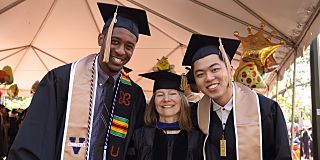Students should understand the basic framework of accounting, including underlying accounting concepts and constraints, that helps them in preparation of financial records, financial statements, and analysis of the major financial statements.
M.S. in Accounting | Admissions
Requirements and Eligibility
At McIntire, we view commerce as the purposeful exchange of goods, services, and ideas to strengthen and advance society, and we believe the future of commerce requires a new kind of leader—one with a rigorous, real-world skill set and a human-centered mindset.
Our applicants are well-rounded individuals who demonstrate a passion for their chosen field of study and are evaluated based on the demonstration of mission-driven skills, knowledge, and character qualities that speak to their potential in these areas. While it is not anticipated that every candidate will exhibit all qualities, these characteristics inform the composition of each incoming class of students and align with McIntire’s overarching mission and educational goals.
-
Academic excellence
-
Intellectual curiosity
-
Strong work ethic
-
Ability to collaborate
-
Awareness and ability to engage across differences in background, perspective, or life experience(s)
-
Growth mindset
-
Initiative
-
Resilience and perseverance
-
Social engagement
-
Unique perspective
-
Personal and professional integrity
As an applicant, you may choose to share and describe the experiences that have led you to develop these qualities through your application materials. The Impact Essay offers a meaningful opportunity to reflect on and convey these experiences.
Requirements
The M.S. in Accounting is designed for candidates with a bachelor’s degree in Accounting or those who have completed the foundational coursework required for CPA licensure and related career paths in accounting, finance, consulting, or tech.
Applicants must earn an undergraduate degree from a regionally accredited college or university and have a strong record of academic achievement.
Applicants also must demonstrate a strong basic foundation in accounting as indicated by completion of the following prerequisite courses:
Introduction to Financial Accounting
Introduction to Managerial Accounting
Students should understand accounting’s problem-solving contributions to management. Topics include planning, control, performance measurement, cost behavior, ethics, and information for special decisions.
Intermediate Accounting I
Students should understand generally accepted accounting principles for asset valuation, income measurement, and financial statement presentation for business organizations, and how these processes evolve. Focuses on the important areas of financial accounting, including accounting for leases, pensions, and income taxes.
Intermediate Accounting II
Students should understand accounting for the equities of a firm’s investors and creditors, along with a continued focus on financial accounting issues, such as financial instruments, asset impairments, and long-term debt.
Prerequisite coursework is not required to apply for admission but must be completed by Aug. 1, prior to matriculation.
MSA Pathway Program (for Current UVA Students)
The MSA Pathway program is designed for UVA undergraduates who are not currently enrolled in the Commerce School and wish to pursue the M.S. in Accounting Program.
As a member of the State Authorizations Reciprocity Agreement, the University of Virginia (UVA) is authorized to provide curriculum in a distance learning environment to students located in all states in the United States except for California. (34 CFR 668.43(a)(6)& 34 CFR 668.72(n)). Upon completion of the M.S. in Accounting Program, graduates may be eligible for initial professional licensure in another U.S. state by applying to the licensing board or agency in that state. Please visit the University’s state authorization webpages to make an informed decision regarding which states’ educational requirements for initial licensure are met by this program. (668.43(a)(5) (v)(A) - (C)). Enrolled students who change their current (or mailing) address to a state other than Virginia should update this information immediately in the Student Information System as it may impact their ability to complete internship, practicum, or clinical hours, use Title IV funds, or meet licensure or certification requirements in the new state. (34 CFR 668.402).


